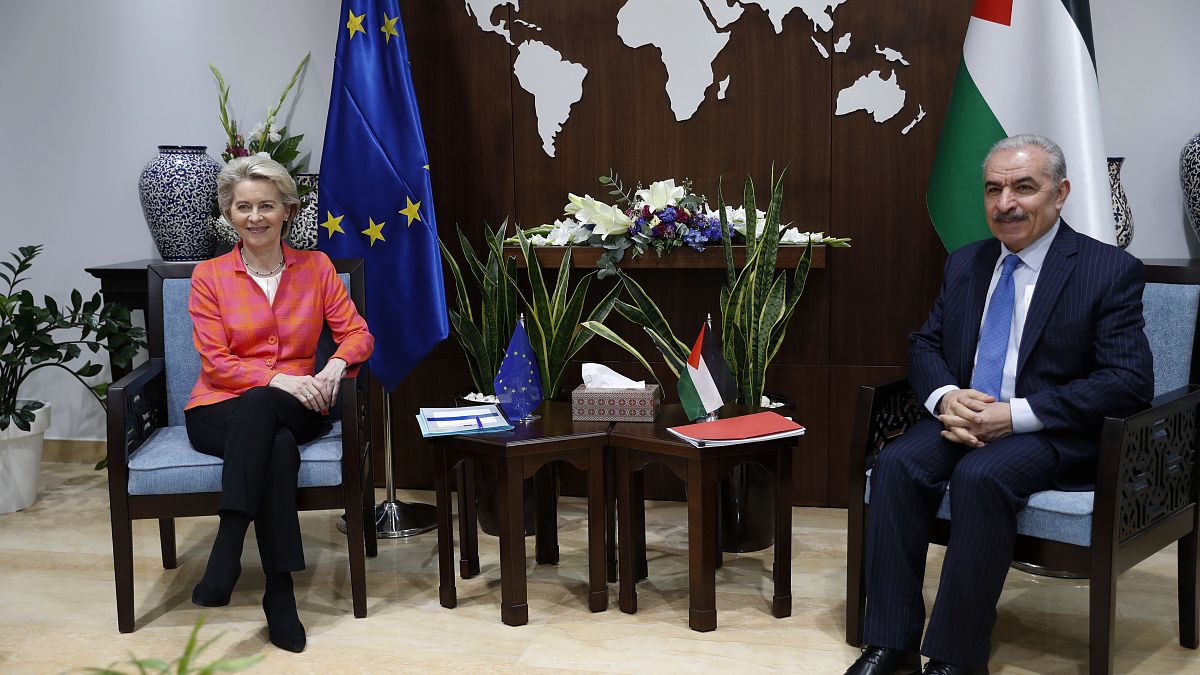A months-long dispute around the content of textbooks effectively blocked the whole package of financial aid.
Following months of inter-institutional disagreements, the European Commission has approved a long-delayed package of bilateral aid for the Palestinian Territories.
The breakthrough coincided with a visit of Commission President Ursula von der Leyen to Israel and the West Bank as part of her Middle East tour.
"I am very glad to announce that the EU funds for 2021 can be disbursed rapidly. All the difficulties are gone," von der Leyen said on Tuesday, speaking next to Palestinian Prime Minister Shtayyeh.
"We have made clear that the disbursement will take place."
An internal dispute involving the Commission, the European Parliament and member states effectively blocked the release of the 2021 programme of financial assistance destined for the Palestinian Authority.
The envelope, expected to be valued at around €200 million, serves to pay the salaries and pensions of certain civil servants in the West Bank, support hospitals and provide help for vulnerable households.
"We aim to finalise the procedure shortly and once finalised, funds will be released as soon as possible. For East Jerusalem hospitals and allowances for vulnerable Palestinian families as priorities," a Commission spokesperson said on Monday in response to a question from Euronews.
"The EU continues to be the biggest donor to Palestine. We have mobilised over €2 billion since 2014."
What was behind the delay?
The budgetary impasse centred on a conditionality regime introduced by Olivér Várhelyi, the European Commissioner who oversees relations with the EU's neighbouring countries.
Várhelyi suggested the Palestinian authorities should make changes to educational textbooks considered to contain anti-Semitic tropes and inflammatory language in order to unlock the EU funds.
The EU doesn't provide funds to design and print textbooks but supports the salaries of many Palestinian teachers who use the materials in their classrooms.
The Commissioner's objections were based on an independent study carried out by the Georg Eckert Institute that "revealed a complex picture": the books adhere to UNESCO standards and have a "strong focus" on human rights but also feature "antagonistic narratives" and "one-sided representations" of Israel and its citizens.
"Textbooks for Arabic language contain emotionally laden depictions of Israeli violence that tend to dehumanise the Israeli adversary, occasionally accusing the latter of malice and deceitful behaviour," the report, published last summer, notes in its executive summary.
Várhelyi, who prior to his current position worked as a diplomat for the government of Hungarian Prime Minister Viktor Orbán, introduced new financial conditions on the funding following the findings of the report.
According to the official, the Commission has stepped up its engagement with the Palestinian Authority to address what he called "highly problematic issues" highlighted by the Georg Eckert Institute.
"The EU has no tolerance for incitement to hatred, violence as a means to achieve political goals, nor to antisemitism in all its forms. Any such material has no place in textbooks or classrooms," the official said last month in a written response to the European Parliament.
Opposition from the co-legislators
Despite Várhelyi's insistence, the conditionality regime failed to gain the necessary endorsement of member states, with at least 15 of them expressing their disapproval of the delay in a letter addressed to the Commissioner himself and obtained by POLITICO Europe.
National representatives are consulted about the Commission's aid programme and can block it by forming a qualified majority (55% of the EU countries representing at least 65% of the EU population).
"It is clear that the Commission's current proposal, which seeks to introduce conditionality in the education sector, does not enjoy broad support," the letter reads.
"When put to a vote, eighteen Member States voted against it or abstained. All those Member States, and others, have since called on the Commission to resubmit its original proposal as a matter of urgency."
A new vote earlier this week confirmed the broad resistance to Várhelyi's plan.
Further opposition had been voiced by three groups of the European Parliament – Socialists & Democrats (S&D), the Greens and the Left – in a letter addressed to President von der Leyen.
"While we condemn in the strongest possible terms all acts of anti-Semitism, racism, or incitement to violence or hatred in all their manifestations, we also strongly believe that any such initiative and decision – based on unfair allegations – would only be counterproductive and create unnecessary tensions among," the trio said in March.
They added that the study had concluded that the textbooks had adhered to UNESCO standards and acknowledged positive changes in 2020/2021.
"These dynamics should be encouraged, instead of hampered, in order to secure progress towards the goal of eliminating hate speech and incitement on both sides in the Israeli-Palestinian conflict," the three political groups said.
On the other side of the debate, a cross-party group of 22 MEPs asked last year for the funds to be withheld until the Palestinian authorities replaced the "terrible books" that, in their view, promote widespread incitement.
"It is impossible to image a future where Palestinians and Israelis will live in peace and security next to each other as long as Palestinian children are being taught to hate," the lawmakers wrote.
Even if the disagreement honed in on the specific issue of textbooks, it obstructed the release of the whole package of financial aid, including healthcare funds.
The Norwegian Refugee Council sharply criticised the delay, saying the suspension is "crippling" critical services with "dire consequences" for patients in need of treatment.
Ahead of von der Leyen's visit, Palestinian authorities had expressed their hope the funds will be approved without conditions.
Euronews reached out to the Israeli Ministry of Foreign Affairs and the office of the prime minister asking to comment.
This article has been updated to include new developments and reactions.
